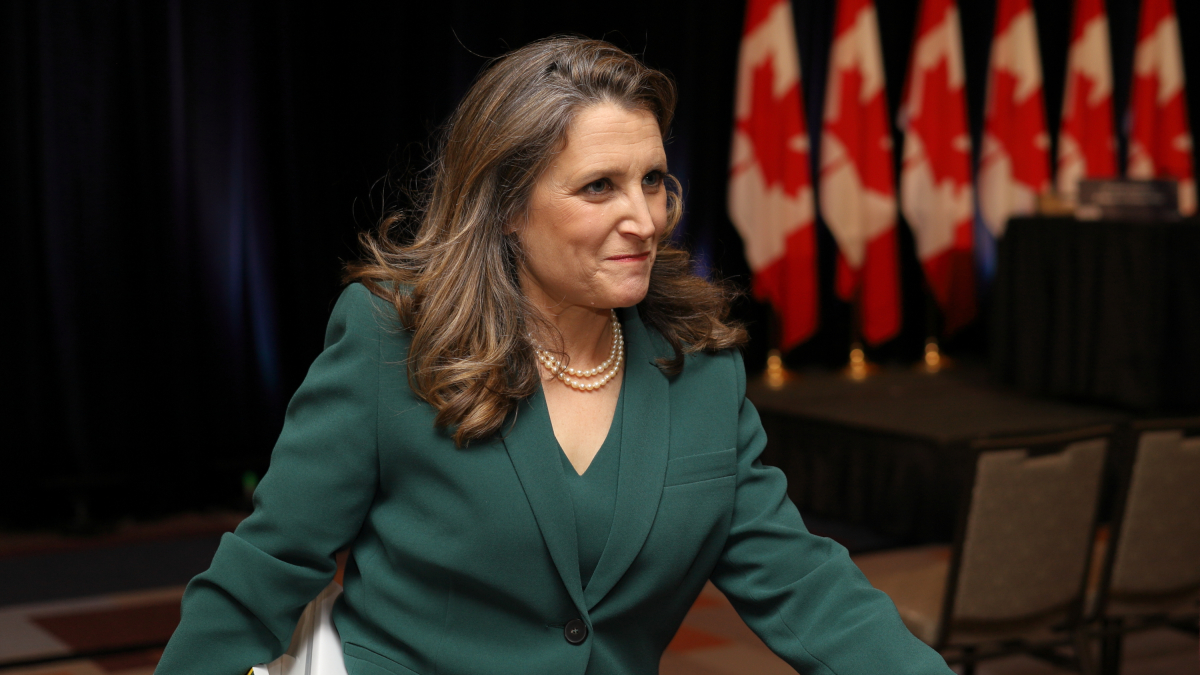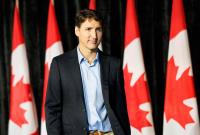Proposed tariffs on Chinese goods driven by politics, critics say

Finance Minister Chrystia Freeland. Photo by Natasha Bulowski/Canada's National Observer
As Canada proposes new tariffs targeting Chinese energy technologies, critics say the move is more about ideology, protectionism and electoral politics than anything China is doing to earn Canada’s rebuke.
Following an announcement from Finance Canada that the federal government is launching consultations to introduce new tariffs on Chinese goods, John Price, a retired history professor and advisor to the University of Victoria’s and Canadian Foreign Policy Institute’s Canada-China Focus forum, told Canada’s National Observer that a trade war initiated by the United States combined with an expected election in Canada has created a complicated moment for Prime Minister Justin Trudeau’s government.
Canada-China relations have been significantly strained in recent years. From the detention of the “two Michaels,” allegations of electoral interference, and China’s threats to impose its own tariffs on canola imports that could take a billion-dollar swipe out of the Canadian agriculture industry, Price suggested Trudeau may be feeling the need to get tough to fend off Conservative Leader Pierre Poilievre as an election looms.
One way to do that is to impose new tariffs on Chinese-made solar panels, batteries and critical minerals, which would increase the cost of those goods and make equivalents made elsewhere more competitive in Canada.
“The Liberals can portray themselves as hard liners vis a vis China… so there's a political dimension to it,” he said.
On Tuesday, as the Liberal caucus retreat was underway, Finance Minister Chrystia Freeland announced her department would open a 30-day consultation period to set new tariffs on certain Chinese goods. The move follows a decision last month to hike tariffs on Chinese-made electric vehicles from six per cent to 106 per cent effective Oct. 1. Tariffs of 25 per cent will be applied to some steel and aluminum products made in China on Oct. 15.
Consultations on new tariffs will focus on batteries, battery parts, semiconductors, critical minerals and metals and solar products, Freeland said.
“If left unchecked, China’s intentional, state-directed policy of overcapacity and other non-market practices could lead to an exponential surge of imports, produced with weak labour and environmental standards,” Freeland said in a statement. “This would undermine the ability of Canada’s EV industry and related critical manufacturing sectors to compete at home and abroad.
“That is why we are acting — in tandem with our key trading partners — to level the playing field and protect Canadian workers.”
If tariffs are imposed, it would bring Canada in line with the United States, which announced plans to increase tariffs on similar items in the spring.
Last week, China launched a complaint at the World Trade Organization over Canada's EV tariffs, and is launching its own anti-dumping investigation into Canadian canola imports.
“There's little question that China has become a technology leader in environmental industries; whether it be in electric vehicle manufacturing or solar panels, China is quite advanced,” Price said. But, “Canada has… taken such an ideological position against China.”
That “ideological position” is emanating from Washington, he said.
The Liberals announced the new tariffs the day after U.S. National Security Advisor Jake Sullivan spoke with Trudeau ahead of the Liberal cabinet retreat in Halifax. That, Price said, makes it clear the new tariffs are “ideologically driven.”
“It was part of the attempt to have a Cold War with China, and Chrystia Freeland is clearly in that camp,” he added.
Two years ago, Freeland advocated for what she called “friendshoring,” a play on the term “onshoring,” which refers to bringing manufacturing back within a country’s borders. In Freeland’s view, to protect supply chains in critically important sectors, allies should work together to minimize the possibility of those vulnerabilities being exploited, she explained in a speech in Washington.
“Democracies must make a conscious effort to build our supply chains through each other’s economies,” she stressed. “Where democracies must be strategically vulnerable, we should be vulnerable to each other.”
In that speech, Freeland accused China of growing increasingly coercive, despite deep ties between China’s economy and the West. “As Putin is murderously proving, economic interdependence does not always prevent war,” she said.
New tariffs imposed by Canada, the United States, and European Union are designed to protect domestic industries by boxing China out of Western markets. Fundamentally, as Freeland described in her 2022 speech, the goal is to decouple China and Western economies in sectors deemed strategically important.
Nonetheless, trade between Canada and China remains high. According to Statistics Canada, China imports $2.7 billion worth of Canadian goods, while Canada imports $5.2 billion of Chinese goods as of July 2024.
“So it's decoupling in theory, and continuing trade in practice, and that's a really complicated dance that's taking place,” Price said.
-With files from the Canadian Press.






Comments
The situation is caused by the cons selling off mines and providing all the raw materials the Chinese need to out produce us. Their answer is to tariffs they insisted be removed for free trade so they could get rich and create the existing food, energy and communications monopolies.
The effect, to cost us even more with a perfectly reasonable retaliation while kicking farmers some more. (which of course they blame on Trudeau)
The notion we can secure our supply lines through trade deals rather than by manufacturing for ourselves is just asinine and turns government into a matter of promoting the needs of the corps over that of the citizens and country.
The libs are as guilty as the cons having jumped on the gravy train. However, they are amateurs compared to the cons, who created and perfected the free trade scam here in the first place.
Other than political, I am sure some of it has to do with the North American big three foot dragging over producing affordable EVs. Their strategy to date has been to produce high-end EVs (i.e. Mustang, F-150 Lightning, etc...), that the average family doesn't need and then wonders why sales are low, go figure. A missed opportunity by our automakers to get in one the ground floor and will now end up playing catch up when they decide to try again.
Western automakers have been resisting the switch to electric with all their might. It is working. There are no reasonably priced, small and simple EVs available from them. They make plenty of money with bigger ICEs and EVs. China, on the other hand, has that kind of EVs. If they were available, they would wipe out western automakers.
So they call for tariffs, and the government obliges. This further slows down the transition to everything electric.